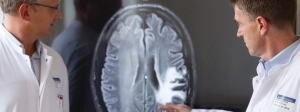Clinical Cooperation Unit Neurooncology
Prof. Dr. Wolfgang Wick
The Clinical Cooperation Unit (CCU) Neurooncology is a cooperation between the German Cancer Research Center (DKFZ) and the Heidelberg University Hospital Neurology Department. The overarching goal of the research is to understand the fundamental biology of brain tumors and rapidly translate the pre-clinical observations back into the clinic in a bench-to-bedside approach. The CCU Neurooncology is structured into two subgroups.
Research in the CCU Neurooncology (Prof. Dr. Wolfgang Wick) focuses on understanding intrinsic glioblastoma and CNS lymphoma treatment resistance mechanisms and additionally investigates the contribution of stem cells and the tumor microenvironment therein. Clinical trials and tumor samples derived within this frame serve as a major resource to understand the interaction between standard-of-care treatments and molecularly defined treatments which highlights the translational research focus of the group.
The research group Experimental Neurooncology (Prof. Dr. Frank Winkler) is addressing the question of how interactions between the nervous system and cancer, and cancer-intrinsic neural mechanisms, drive brain tumor initiation, growth, invasion and resistance. This field is called "Cancer Neuroscience” and has led to paradigmatic discoveries with clinical implications. Bespoke technologies, including intravital microscopy methods, are developed to interrogate the malignant networks and their communication strategies - in incurable gliomas, brain metastases, and cancers outside the brain.
More detailed information about each subgroup can be found on the respective websites.
CCU Neurooncology
RG Experimental Neurooncology


